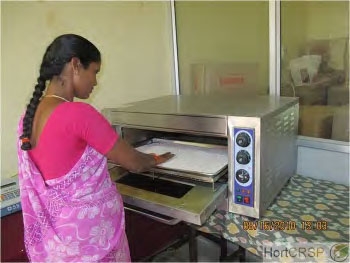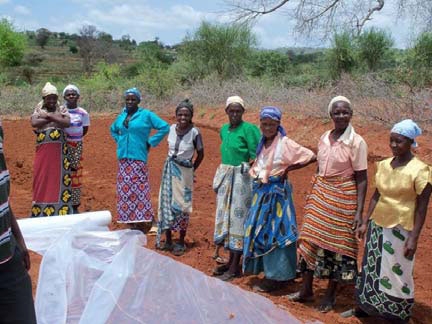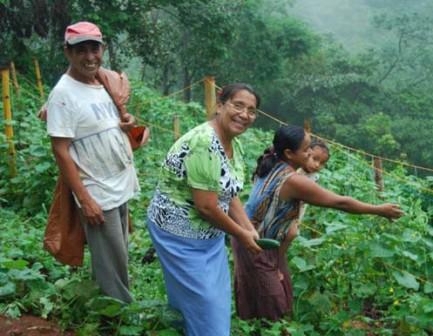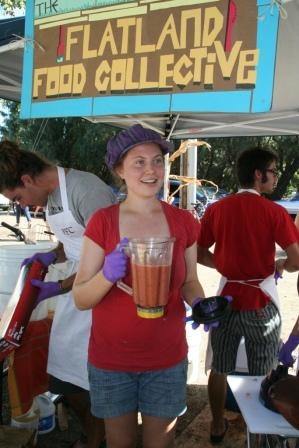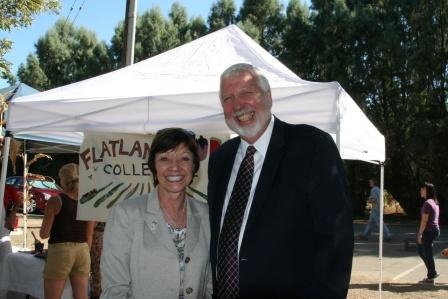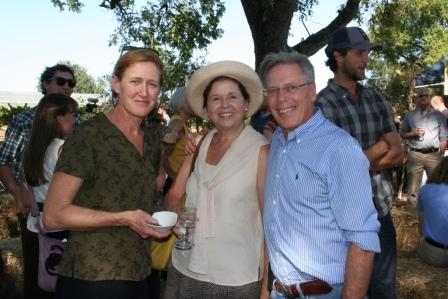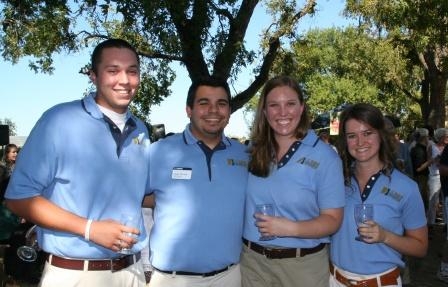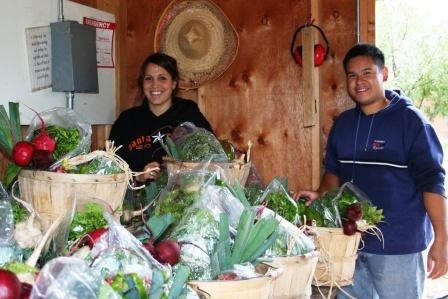Posts Tagged: food sustainability
Addressing nutrition and poverty through horticulture
Nutrition, food security and sufficient family incomes are challenges in many parts of the world. Half the world’s people live in rural areas in developing countries. Because hunger and malnutrition are often linked to poverty, providing economic opportunities through horticultural production not only helps family incomes, but also addresses food security and nutrition. Training women to produce and market horticultural crops in the developing world also helps provide a much-needed income stream for families with children.
UC Davis is addressing food security and economic development in Africa, Southeast Asia, Central America, and elsewhere, by coordinating an international horticulture program. The Horticulture Collaborative Research Support Program (Hort CRSP; pronounced "hort crisp") is one of 10 CRSP programs that focus on global food production and solving food and nutrition problems in developing countries. UC Davis leads the Hort CRSP, with funding support from the U.S. Agency for International Development (USAID).
Examples of projects conducted by researchers and educators throughout the world include:
- Inexpensive cold storage systems in rural, developing areas to prolong food longevity; see page 2
- Concentrated solar drying of fruits and vegetables in East Africa; see page 3
- Improving safety and quality of tomatoes in Nigeria; see page 3
- Smallholder flower production in Honduras for export markets; see page 3
The overarching goals of the Hort CRSP are to reduce poverty and improve nutrition and health of the rural poor, while improving the profitability and sustainability of horticulture in the developing world. Priorities in the Hort CRSP include gender equity, sustainable crop production, postharvest technology, food safety, market access, and financing. The program awards research funding in the U.S. and abroad to:
- Realize opportunities for horticultural development
- Improve food security
- Improve nutrition and human health
- Provide opportunities for income diversification
- Advance economic and social conditions of the rural poor, particularly women
Dr. Elizabeth Mitcham, UC Cooperative Extension specialist in the Department of Plant Sciences at UC Davis and director of the Hort CRSP, notes, “By harnessing the research, training, and outreach expertise of the land-grant universities in the U.S. to work with partners in developing countries, we can improve horticultural capabilities in much the same way that the land-grant system helped revolutionize American agriculture.”
In the three years since the program’s inception, several projects have been completed, and many are ongoing. The program’s website offers a plethora of information, along with newsletters that highlight individual projects.
The program also has a YouTube channel, with videos on Hort CRSP projects. Some of the videos are about projects that are especially important in developing countries, including:
- The TRELLIS project — bringing together graduate students and in-country development organizations; YouTube link
- Using cell phones to give real-time information to growers in rural areas of India; YouTube link
- Inexpensive cultivation practices for smallholder farmers; YouTube link
- Indigenous products increase incomes in Ghana; YouTube link
- Saving indigenous crop seeds in Southeast Asia for resource-poor farmers; YouTube link
UC Davis, ranked first in the U.S. on research related to agriculture, food science and nutrition, and plant and animal science, is positioned to serve global needs related to food and nutrition. Of the 10 CRSP programs administered by USAID, two of the programs are based at UC Davis — the Hort CRSP program, and the BASIS CRSP, which was highlighted in a recent Food Blog post and addresses financial issues related to agricultural productivity.
Sustainable agriculture and food systems: An innovative new major at UC Davis
Two terms related to food production — “sustainability” and “food systems” — have been blended into a new major at the University of California, Davis. Sustainable Agriculture and Food Systems, the new undergraduate major, in some ways embodies a re-blossomed, student-driven interest in food production, akin to the organic farming movement of the 1970s.
Food systems is a broad term that addresses nutrition and health, sustainable agriculture, and community development. A food system encompasses the entire production chain, not only from farm to fork, but includes broader topics such as short- and long-term impacts on the environment, labor, management of food inputs (e.g., water, pesticides) and outputs (e.g., waste), and the socioeconomic impacts on communities engaged in the food system. In other words, food systems encompasses agricultural production within the broad context of environmental, economic, social, and political concerns.
Neal Van Alfen, dean of the College of Agricultural and Environmental Sciences at UC Davis, noted during the celebration ceremony for the new major, “Agriculture is incredibly knowledge intensive. It is as knowledge intensive as launching rockets.” He cited a terrarium as a model for how we must maintain a sustainable food production system with limited resources to feed a rapidly growing global population. “The planet is a closed system,” Van Alfen said. “We have to get it right.”
Professor Tom Tomich, master adviser for the major and director of the UC Davis Agricultural Sustainability Institute, said, “The major is about leadership, as much as it is about education. It’s about creating a new generation of leaders who will go on to guide the sustainability transformation for this country and for this planet.” Unlike student programs that are limited to classroom learning, Tomich said that the curriculum for the new major combines the best of three worlds — classroom and labs, the Student Farm, and the real world.
Karen Ross, Secretary of the California Department of Food and Agriculture, attended the opening, along with other high-level state leaders in agriculture, including Craig McNamara, president of the California State Board of Food and Agriculture, and Don Bransford, president of the UC President’s Advisory Commission on Agriculture and Natural Resources.
UC Davis chancellor Linda Katehi, who spoke about UC Davis’s national leadership in sustainability, noted, “This leadership from the state shows the importance of the program and what impact it may have on the state, on us as an institution, and on our students.”
“Agriculture and food have shaped human civilization and are central to well-being and health,” said Ralph Hexter, provost of UC Davis. “We recognize the need to understand both the natural world and our human activities holistically.” Addressing the global significance of the major, Hexter added, “Sustainable Agriculture and Food Systems is a major that is truly designed for the 21st century. It responds to today’s needs and incorporates experiential learning and state-of-the-art research.”
A recent UC Davis graduate who helped lay the groundwork for the curriculum, Maggie Lickter, spoke passionately to the 200 people celebrating the major. She said that the major is driven largely by students who have cutting-edge ideas and want to be engaged in creating a useful education. Lickter said that many students felt that components were missing from the traditional agricultural curriculum, such as farming practices grounded in an understanding of ecological systems, and the application of critical thinking skills to modern-day food systems.
In a moving tribute to the success of establishing the major, Lickter said, “This work can’t stop. If you stop stoking romance, love dissolves. If you stop tending a garden, plants wither. So we must stay committed to the evolution of this major.”
Dean Van Alfen, a strong proponent of UC Davis partnerships with the California agriculture industry, views this major as an additional way to create graduates with industry-ready work skills. Addressing UC Davis’s national and global leadership in agriculture, he said, “Agricultural sustainability has been a theme of this campus for a very long time. This new interdisciplinary major is the future in so many ways. It reflects our campus spirit and our culture. It will meet the needs of our stakeholders and the future of our planet.”
For more information:
- UC Green Blog
- Early press release
- UC Davis Student Farm
- UC Davis Agricultural Sustainability Institute
- About the major
New college degree: “Sustainable agriculture and food systems”
The University of California, Davis, is launching a new undergraduate major — “Sustainable Agriculture and Food Systems.” The program integrates several subjects to give students an understanding of the many issues facing contemporary farming and food systems, including production, processing, distribution, consumption, and waste management.
As noted in the Los Angeles Times, “With rising public interest in where our food comes from — as well as in "green" living — it makes sense that higher education would be eager to attract students who want to tap into the intersection between these two fields.”
Students will focus on the social, economic, and environmental aspects of agriculture and food — from farm to table and beyond. The program is designed to help students obtain a diversity of knowledge and skills, both in the classroom and through personal experiences on and off campus.
Students will take courses in a broad range of disciplines, but will focus in one of three tracks: Agriculture and Ecology, Food and Society, or Economics and Policy.
“This interdisciplinary curriculum will prepare students to become leaders in agriculture and food systems,” said professor Thomas Tomich, the major adviser for the program and director of the Agricultural Sustainability Institute at UC Davis.
The major is new, but UC Davis has been covering the subject in field- and classroom-based interdisciplinary learning opportunities at the Student Farm at UC Davis for more than 35 years, said Mark Van Horn, the Student Farm director who will teach a core course in the major.
“Learning through doing and reflection adds a valuable dimension to students’ education because it helps them see the connections between theory and practice in the real world,” Van Horn said.
“This is an exciting addition to the college that reflects a change in how we think about food and agriculture,” said Neal Van Alfen, dean of the College of Agricultural and Environmental Sciences. “Students will gain a broad perspective of what it takes to put dinner on the table in an era of greater demand and fewer resources.”
For more information:
- Full press release
- UC Davis Student Farm
- UC Davis Agricultural Sustainability Institute
- About the major

